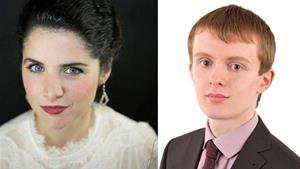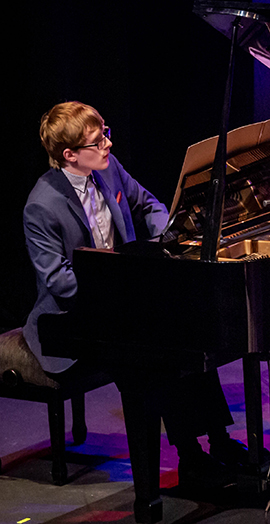
Frasier Hickland (21), who is a budding pianist from Anahilt in County Down, is going places… and one of these will be the Down Arts Centre on Friday 27th September where he is doing a recital with Dublin-based soprano Eileen Coyle, a Lay Vicar at Christ Church Cathedral who also sings with several professional ensembles in Ireland.
Jim Masson of Down News caught up with Frasier for an interview during a visit home on a break from his increasingly busy schedule of public performances, musical studies and long hours of practice.
What are your earliest musical memories ?
One in particular which sticks out for me was as a child, listening to my mum playing Beethoven’s Piano Sonata in G Major, or the ‘Cuckoo’ as it’s often called. She was also partial to an eclectic mix of Billy Joel, Kate Bush and Ella Fitzgerald albums on the school runs!
When did you first start playing music?
I started on the violin when I was 8, and then piano several years later. I’d watched ‘The Sound of Music’ for the first time and noticed a book of piano arrangements in my mum’s collection – I just HAD to learn how to play the songs from it! Before moving to Dublin, I also took organ lessons with Michael McCracken at Down Cathedral, which I really enjoyed.

Has your mum been a big influence as a teacher?
Absolutely – I had my first piano lessons with Mum, so if it wasn’t for her I’d probably be on a different life path to what I’m on now. She never forced me to play and was of the opinion that it had to be my choice, so I was entirely self-motivated to learn. I think a different type of teacher may have tried to steer me in a specific direction, which might not have encouraged my love of music at that early stage.
When did you realise you had a big musical talent ?
It was a rather out of the blue encounter actually. I’d been on holiday in Paris and having arrived at the Charles de Gaulle airport for the flight back home, I noticed a piano in the departure lounge. Something drew me over to it. A Moroccan concert pianist was also waiting on his flight and he commended me on my technique. From then on, I knew I should further advance my studies and I went to my second teacher, Iryna Johnston, a brilliant Ukrainian concert pianist here in Northern Ireland who shared her vast musical knowledge with me until I left to study in Dublin.
How much practice do you do each day/week?
Generally I aim for at least four hours minimum each day – more if at all possible! Having said that though, it isn’t a question of quantity but rather quality. You could spend hours practising and achieve nothing if it’s not done efficiently. There’s also practising away from the instrument, through listening to recordings, researching history and reading over scores, etc.
And what about before performances ?
Practice really depends on the performance. Once in a while, I’ll be given only a few weeks’ notice to learn an hour-long concert programme from scratch (which needs more intensive preparation) but, if it’s within my control, I like to have a programme ready a couple of months prior, to allow time for the music to settle and add final touches. This way it avoids what I call ‘panic practice’!

How do you feel playing in front of a live audience ?
One of the tasks a performer has is to make people leave happier than when they arrived. Someone in the audience may have had a rough day and your playing could potentially lift their spirits. That’s my general philosophy in a concert situation. I mean, everyone has their own personal baggage but it’s best left outside the stage door. Although, having said that, on occasion I’ve been able to inject energy from past experiences into performances, which I think adds a sense of authenticity.
What are the highlights of your performances to date?
I was incredibly lucky to do an internship with Northern Ireland Opera last year and, since then, I’ve been working on various projects with the company, including their recent productions of ‘Daphnis et Chloé’ and ‘L’île de Tulipatan’ for the Jacques Offenbach Bicentenary, as well as frequent performances with their studio artists. Another highlight this summer was being selected as pianist for the Ulster Youth Orchestra, appearing onstage with them and the flautist Eimear McGeown in the Guildhall, Derry/Londonderry, and the Ulster Hall, Belfast.
What are your special moments ?
Two that stand out for me occurred within the span of one year. In May, I had the privilege of performing for HRH Prince Charles in Hillsborough Castle, with NI Opera singers, and last November I played at the unveiling of a Polish War Memorial in Newtownards for Arkady Rzegocki, (the Polish Ambassador to the UK), an event which also coincided with the centenary of Polish independence.
Who are your mentors? How have they been helping you?
My main mentor is my current teacher, Professor Anthony Byrne. He’s helped me grow so much in the past two years, not just as a pianist, but as a person as well. He encourages his students to be quite independent, so we have to think for ourselves. Of course, he’s also an amazing teacher who will always give you an honest opinion about pretty much anything, which is what I value most. And he constantly keeps an eye out for any exciting prospects for his students!
What do you want to achieve in music ?
I would like to go down the song accompanist/répétiteur route. This is fancy lingo for a pianist who coaches and plays for singers. Since I moved to Dublin, I’ve worked with such a wide variety of singers, from all different backgrounds. What I love about the human voice is its uniqueness and sense of individuality. I would like to do more chamber music in the future too.
Your reputation is growing quickly. Does this boost your confidence ?
I would say it boosts my expectations of myself. As they say, you’re only as good as your last performance, so that’s why I strive to perform at my optimum, because you never know who might be present. Whether it be a church hall or the National Concert Hall, every audience deserves the best I can give!
Your parents have been a great support. How is it cooking your own meals in Dublin ?
And they still are! They hardly ever miss one of my performances and Dad has chauffeured me to events all across the country, introducing me to people who have had a positive impact on my musical career. I’m so grateful for that level of support. As far as cooking goes, I’ve always tried to be self-sufficient wherever possible, but not to the point where I’d be too stubborn to accept a free meal when it’s on offer!
Why did you opt for RIAM?
When I was in upper sixth, I was doing a solo recital in Lisburn as a fundraiser for the Alzheimer’s Society. I met someone there who has been very influential in regard to my musical journey. They were curious to know what my plans were and, at that time, I was intending to do a degree in music education at Trinity College Dublin. They knew people connected to the RIAM and shortly after I went for a consultation with Anthony Byrne. He was (and still is!) immensely encouraging and a few weeks later I auditioned for the performance course at the Academy. I was still undecided as to which route to choose but, when I got an offer from the Academy, I knew instantly it was meant to be!
Are you enjoying the course?
Yes, it’s a really wonderful place to study and I’ve got to know – and work with – a lot of superb musicians. I’ve participated in masterclasses with artists such as John O’Conor, and I play quite a bit of chamber music, not just with the really popular instruments, but also the likes of oboe, French horn, viola, and so on. I’ve even had the honour of performing on a piano made by Muzio Clementi himself! The instrument was donated to the Academy 20 years ago and it was the first time it had been used since then.
Any social life as a student or are you totally focused ?
While I remain focused on the path I’m on, it’s important to recognise you can’t spend every hour in a practice room! Networking is such an essential part of a musician’s life so it’s good to get out and meet new people.
What are your future plans upon completion of your four year degree in Dublin ?
I still have two years before I finish my degree course but, following that, I’ll possibly make the move to London to study for a master’s degree in collaborative piano. What I’m currently doing is mainly solo work whereas, after my degree, I aim to focus more specifically on ensemble work.
What are your main targets as a musician ?
At this stage, it’s about performing as much as possible to build up my public profile. One of the best parts of collaboration is getting to meet and work with new people who come from different backgrounds and bring their own unique energy. It’s very exciting because you’re relying on the other person (if it’s a duo) and if they do something in a slightly different way from what’s been rehearsed, you have to go with it in that moment.
Do you have any other interests apart from music ?
I’ve had a keen interest in languages since my schooldays. I studied French and Spanish at A-level and, at the minute, I’m learning German. With language also comes the chance to find out about other cultures, and I’m delighted to be involved in various projects with the Belfast-based Polish organization ‘For Your Freedom and Ours’ which focuses on educating local people about other cultures by providing shared history programmes.
I also enjoy reading poetry, which actually is going to form the basis of a recital I’m doing with soprano Eileen Coyle in the Down Arts Centre on 27th September. It will consist of musical settings of Irish poems by W.B. Yeats, Francis Ledwidge, and Thomas Moore, along with poets from further afield like Hermann Hesse and Paul Bourget.
Lastly, a double edged question: what are your main musical influences, and favourite composers or scores ?
In terms of pianists, I’m a big fan of Arthur Rubinstein. For me, he brings something very personal to his performances, and he really connects with the music. As for composers, there are too many to mention, but I think Bach will forever be my number one! In terms of songs, Schubert and Fauré would be top of my list, although one of my favourites is Liebst du um Schönheit by Mahler, which he wrote for his wife Alma.
Don’t miss the performance in the Down Arts Centre on Friday 27th September which starts at 8pm. Tickets are £12 and can be purchased from the Down Arts Centre or booked on: 028 44 610747.
























